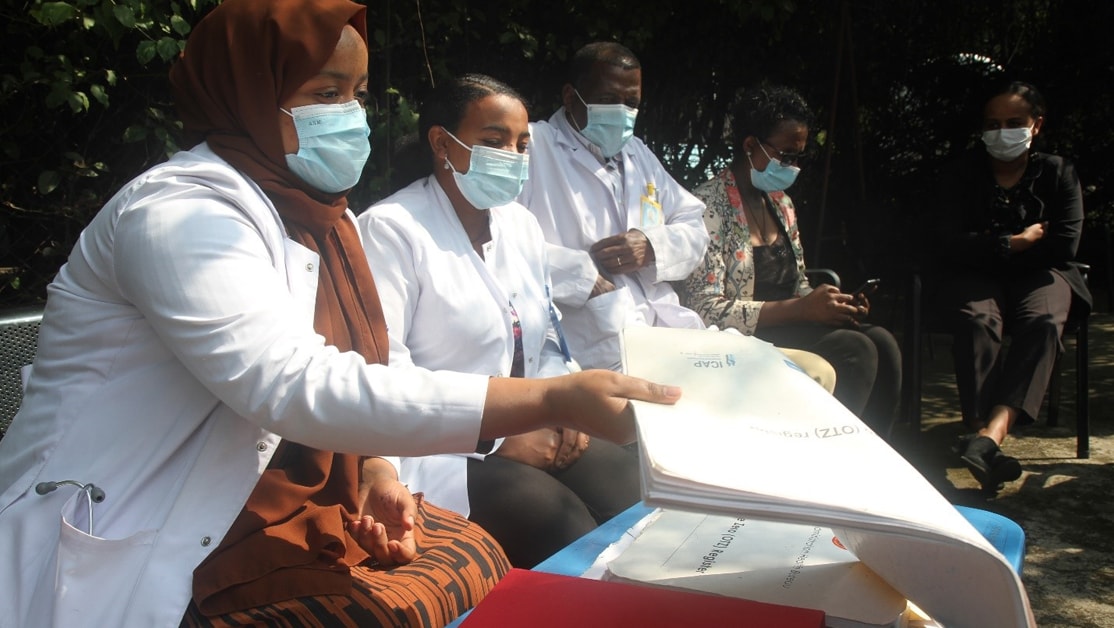At a glance
This story describes the challenges children and adolescents living with HIV face in Ethiopia. With support from CDC, Operation Triple Zero has been helping to achieve an AIDS-free generation.

Background
In 2020, about 1.75 million children and adolescents living with HIV (C/ALHIV) aged 10 to 19 worldwide (UNAIDS, 2021). With lifelong, continuous antiretroviral treatment (ART), C/ALHIV can live normal, healthy lives. However, without treatment, they may suffer from severe illness and the majority will tragically not survive into adulthood.
To improve pediatric HIV care and treatment, CDC provides technical assistance to the Ethiopian Ministry of Health (MOH) and its partners. This initiative is a part of the U.S. President’s Emergency Plan for AIDS Relief (PEPFAR). Since its inception in 2007 until 2020, over 32,500 C/ALHIV have benefited from these services. ART enrollment has progressively improved over the years. However, HIV viral load suppression (VLS), which indicates effective treatment, remains lower among C/ALHIV than adults living with HIV.
Operation Triple Zero
To improve VLS among C/ALHIV, CDC Ethiopia worked closely with MOH and partners to promote key interventions. Following World Health Organization (WHO) and PEPFAR guidelines, these interventions optimized pediatric ART regimens and customized service delivery for adolescents.
One customized adolescent-focused service delivery model introduced by Ethiopia is Operation Triple Zero (OTZ). The three zeros stand for zero viral load, zero missed appointments, and zero missed drugs. OTZ enrolls adolescents aged 10 to 19 in peer support groups at select health facilities in Addis Ababa, Ethiopia's capital.

The program provides innovative health service delivery options for C/ALHIV, including:
- Weekend services.
- Monthly peer support group sessions.
- Integrated sexual and reproductive health services.
- HIV status disclosure counseling.
- High viral load management.
The training and curriculum materials reflect the latest in HIV science with messages tailored to adolescent audiences.
OTZ is one reason why HIV viral suppression among C/ALHIV ages 10 to 19 years old in Ethiopia has improved. For example, the rate went from 81 percent in 2019 to 91 percent in 2021. This improvement ultimately met UNAIDS 2020 targets for VLS.
OTZ builds upon existing peer support programs by engaging C/ALHIV participants in the planning and implementation of the program. Participants who have gone through the program and have shown great leadership and communication skills are selected as "Adolescent Champions."
These champions:
- Work directly with health providers to design group sessions.
- Participate in counseling sessions for C/ALHIV and their caregivers.
- Communicate with participants who have missed appointments or refills.
Ermias' story
A recent review of the program showed high levels of program participation, HIV treatment continuity, and VLS among OTZ participants. These were far superior to program results prior to its introduction. In addition, OTZ provides life-changing psychosocial benefits to participants.
Ermias, 19, is an Adolescent Champion. He explains how OTZ has changed his life:
"Before I enrolled in the OTZ program, I dealt with challenges, including severe discrimination, even by my own relatives. When my relatives heard that my mother and I were living with HIV, we faced eviction and destitution. Because of that, I spent so much time alone with hopelessness. There were times when I even contemplated suicide."
When talking about the benefits of the program, he states, "the close follow up by the adherence supporters helped to suppress our viral load levels. The psychosocial support sessions and life skill trainings have helped us grow into young boys and girls who can take care of ourselves and become great role models for our friends. So, in broad terms, this program will play its own part to set values in our society. We have high hopes for our futures."
Looking towards the future
OTZ has helped transform Ermias from struggling to manage his HIV to becoming a HIV treatment champion and helping other youth. CDC is now supporting further scale up of OTZ to reach more eligible C/ALHIV. This is an important step in achieving an AIDS-free generation in Ethiopia.
